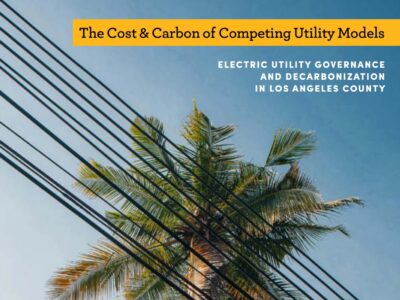New Report: Charging and Financing Electric Trucks
CLEE/UCLA Law report & webinar offers solutions to meet California’s zero-emission trucks goal
California has groundbreaking goals to require automakers to sell, and large fleets to purchase, zero-emission trucks and buses in increasing percentages, starting this year. But these goals will only be achievable if the state has sufficient charging infrastructure to fuel the vehicles, along with available financing to help truck owners purchase or lease them.
To address these dual needs, UC Berkeley Law’s Center for Law, Energy and the Environment (CLEE) and the UCLA Law Emmett Institute on Climate Change and the Environment are today releasing the new report Fueling & Financing: Addressing the Urgent Challenges Facing Electric Heavy-Duty Vehicle Deployment.
The report offers a suite of recommendations for policy makers and industry leaders to help address the key challenges to infrastructure deployment and financing, based on two convenings with a group of expert stakeholders. Key recommendations include:
- The California Legislature and Public Utilities Commission could require utilities to improve energization timelines and authorize utilities to advance expenditures to fund grid upgrades for heavy-duty charging infrastructure sooner
- The Governor could create an executive level “charging working group” or “czar” with the authority to ensure coordination and hold accountable state agencies responsible for the deployment of charging infrastructure to support the heavy-duty vehicle sector
- The California Legislature and Air Resources Board could modify Hybrid and Zero-Emission Truck and Bus Voucher Incentive Project (HVIP) funding to ensure more targeted uptake by fleets more readily able to electrify
- The California Infrastructure and Economic Development Bank (IBank) and Air Resources Board could facilitate private-sector lending for heavy-duty electric vehicles and associated infrastructure
- The California IBank or Legislature could expand and expedite loan loss reserve programs to offset investor and insurer concerns about the residual value of used vehicles
By implementing these and other solutions, California leaders can ensure the transition is feasible, which is crucial to the state’s broader climate and air pollution goals. The California Air Resources Board reports that in 2021, heavy-duty trucking was responsible for over 30 million metric tons of greenhouse gas emissions, making up roughly 10% of the state’s total emissions. The pollution from these vehicles also disproportionately affects low-income and disadvantaged communities, exacerbating public health issues and deepening environmental injustices.
Zero-emission electric versions of these vehicles are already on the road and becoming more widely available. But the California Energy Commission estimates that by 2030, the state will require 114,500 charging stations to accommodate the projected 155,000 medium- and heavy-duty electric trucks and buses. In addition, the upfront price of battery-powered heavy-duty vehicles is currently higher than their fossil-fueled counterparts, leading to the need for financial assistance for many purchasers, particularly smaller fleets.
For this transition to succeed, it will require not just technological innovation but also robust policy support and financial investment. The solutions outlined in this report can hopefully offer a path for state policymakers to ensure that the decarbonization of heavy-duty vehicles is feasible and rapid, while addressing urgent equity, climate, and economic concerns.
Fueling and Financing is the latest release from the Climate Change & Business Research Initiative, a collaboration between Berkeley Law’s Center for Law, Energy, & the Environment (CLEE) and UCLA Law’s Emmett Institute on Climate Change & the Environment. Since 2009, initiative leaders have published a series of policy papers and organized multiple events on how climate change will create opportunities for specific sectors of the business community and how policymakers can facilitate those opportunities.
To learn more, register for our webinar on the report on Thursday, September 19th at 10am PT, featuring a keynote by Dr. Steven Cliff, Executive Officer at the California Air Resources Board, followed by a panel discussion with Niki Okuk, Deputy Director of Trucks and Off-Road at CALSTART and Adam Browning, Executive Vice President at Forum Mobility.
Read the full report here.
This post was co-authored by CLEE climate fellow Shruti Sarode.






Reader Comments